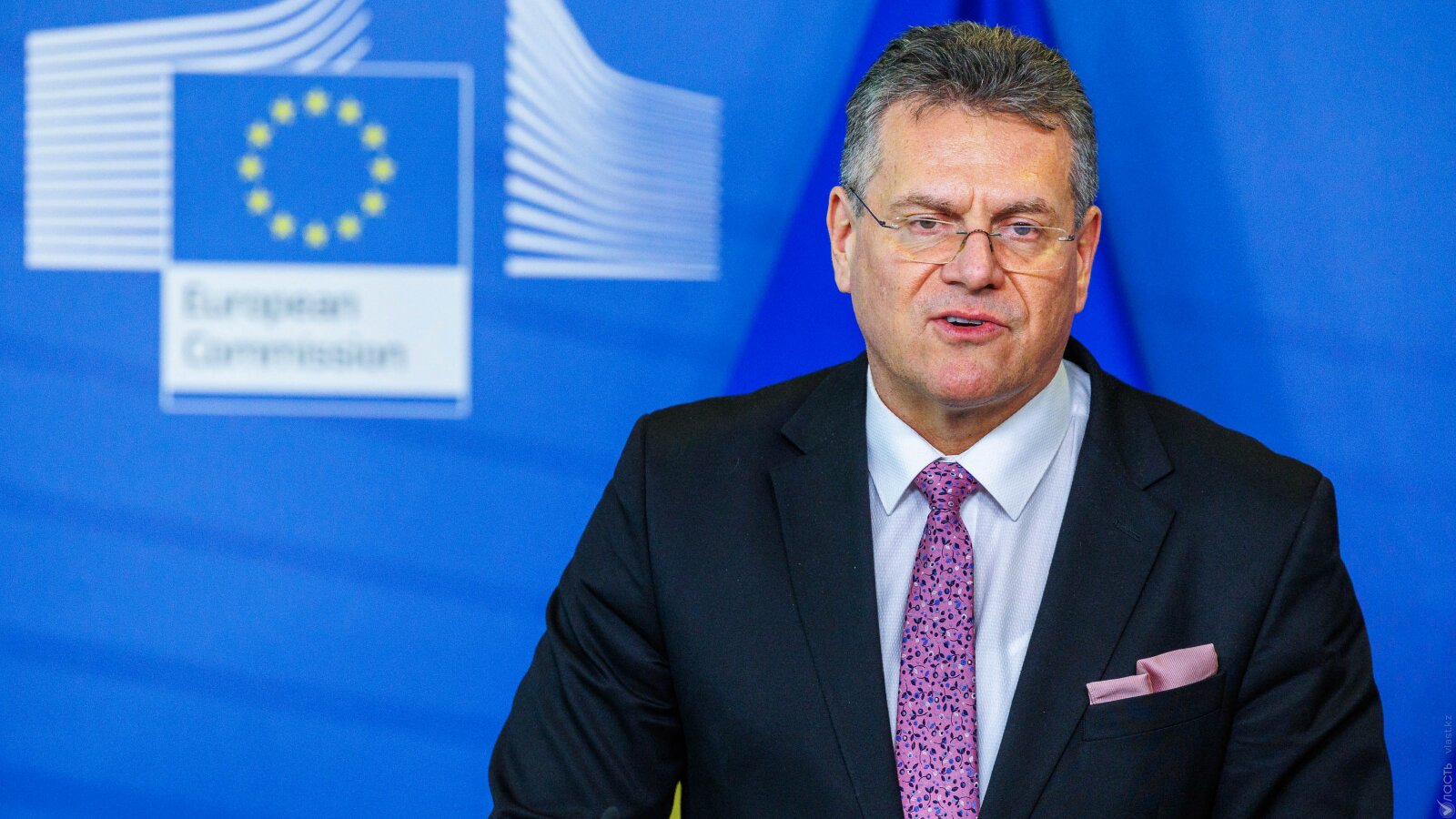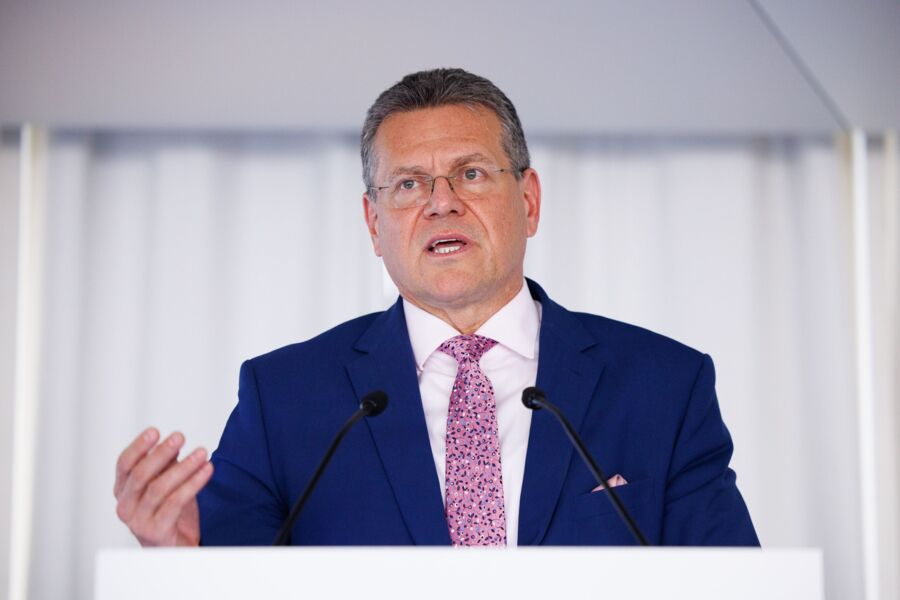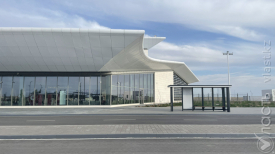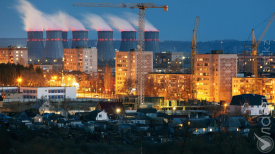- ВКонтакте
- РћРТвЂВВВВВВВВнокласснРСвЂВВВВВВВВРєРСвЂВВВВВВВВ
Maroš Šefčovič, the vice-president of the European Commission (EC) for Interinstitutional Relations, is visiting Astana on June 1 and 2 and meeting with high-level officials in an effort to coordinate and strengthen the cooperation between the European Union (EU) and Kazakhstan. We reached him for an exclusive interview spanning partnerships in the mining and hydrocarbon sector to sanctions against Russia in the context of the war against Ukraine.
Mr Šefčovič, the purpose of your visit to Kazakhstan is meant to take first steps in implementing the Strategic Partnership Roadmap. What are the areas of cooperation that you will discuss?
The geopolitical challenges arising from Russia’s illegal aggression against Ukraine have put a renewed emphasis on the need to reduce our dependencies and strengthen our open strategic autonomy, in particular in the field of critical raw materials and energy. The EU-Kazakhstan strategic partnership on raw materials, batteries, and renewable hydrogen will be at the center of my discussions. It is important that we now transform our commitment into concrete actions. I will also discuss future avenues of cooperation in the field of energy. To that end, I will meet with prime minister Alikhan Smailov, minister of industry Marat Karabayev, and minister of energy Almasadam Satkaliyev. I will also participate in the first EU-Kazakhstan Sustainable Energy Days to discuss regional experiences and prospects on achieving carbon neutrality. Finally, given the crucial importance of the private sector in achieving the green and digital transitions, I will meet with CEOs of EU and Kazakhstani businesses.
Your participation in the Mining and Metallurgy Congress seems to clearly define the scope of the visit to a specific sector of Kazakhstan’s economy. What are the prospects of cooperation in this industry? Are you also discussing EU-Kazakhstan partnership in other areas?
I am indeed participating in the 13th International Astana Mining & Metallurgy Congress. Kazakhstan is a key partner for the EU in the field of critical raw materials and I am keen on making concrete steps to advance the implementation of our strategic partnership in this area. Today, I witnessed and welcomed the signature of a memorandum of understanding on sustainable mining between the European Bank for Reconstruction and Development (EBRD) and Kazakhstan’s state-owned mining company, Tau-Ken Samruk, which stresses – and this is extremely positive – the privileged link between Kazakhstan’s mining sector and the EU’s downstream value chains. Moreover, the letter of intent that I signed today reiterates the EU’s commitment to explore options for closer cooperation with the EBRD and more broadly to deliver on the implementation of the strategic partnership.
The European Union and Kazakhstan this year marked the 30-year anniversary of their relations. The EU is Kazakhstan’s biggest trade partner, representing 30.8% of its foreign trade. The EU is also the largest foreign investor in Kazakhstan, with an overall net Foreign Direct Investment stock of over $78 billion, representing 51% of the total.
As close partners, we share a strong and clear commitment to intensify our mutual cooperation in many strategic sectors. From strengthening energy security to developing alternative energy supply routes to enhancing sustainable and secure digitalization, including digital sovereignty; and from improving transport connections to transitioning to a green, sustainable and climate-neutral economy that creates jobs for people, our partnership with Kazakhstan is wide-ranging, and it is in line with Global Gateway, the EU’s strategy to invest up to €300 billion worldwide in partner countries to support the green and digital transition.
Sanctions against Russia have become a hot topic since the start of the war against Ukraine, especially since news emerged about Russia’s companies and individuals trying to circumvent them. How has Kazakhstan fared with respect to avoiding a triangular trade that effectively bypasses the sanctions regime? What are the measures that the EU will suggest for Kazakhstan’s government to implement?
We are regularly discussing with our partners in Kazakhstan the damaging consequences of Russia’s illegal aggression against Ukraine on regional stability and security. We appreciate the principled position of Kazakhstan in international fora founded on the respect for the UN Charter and the territorial integrity of all UN members, including Ukraine. In this context, we have noted Kazakhstan’s efforts to ensure that its territory is not used to circumvent or undermine European and international sanctions. The aim of the sanctions is to limit [Russia’s President Vladimir] Putin’s ability to continue perpetrating his bloodshed against the Ukrainian people and the destruction of civilian infrastructure in Ukraine. We expect all our partners to align with our sanctions or, at the very least, to ensure that Russia is not bypassing them.
David O’Sullivan, the EU’s Sanctions Envoy, has visited a number of third countries, including Kazakhstan, to discuss the EU’s work on the implementation of the sanctions and measures to tackle circumvention. Opening a dialogue and ensuring close cooperation is of key importance in addressing the issue of possible circumvention of sanctions via third countries. The relevant authorities have been cooperative and have engaged in a constructive dialogue to address issues of common concern.
In some cases, companies registered in Central Asia have “cooperated” with companies in the EU (Latvia, Finland, and Germany, to name a few) to import materials that were then re-exported to Russia. Is there a possibility for EU customs officials to control this trade more closely? Or is the task only on the shoulders of the Central Asian governments?
First and foremost, it is for EU member states to implement EU sanctions. This means that they are responsible for ensuring that export bans, for example, are properly respected by EU companies. EU customs authorities indeed play a very important role here. Let there be no doubt: EU companies must abide by EU sanctions, which are legally binding. The Commission is working hard to ensure the proper, uniform implementation of sanctions across the EU, as well as cracking down on circumvention. The Commission has mobilized its trade and customs services to identify the redirection of trade flows from certain third countries acting as possible gateways to Russia. Outreach to the countries in question is underway to find a shared assessment, compare data and discuss remedial measures as appropriate. In parallel, the Commission gathers information on circumvention patterns from the private sector, as well as recommendations on how to better prevent this phenomenon.
Mr Šefčovič, you have strongly advocated for coordination between the EU and neighboring countries for what concerns natural gas trade. Earlier in May, you assessed as a “remarkable success” the first tender process through the EU’s joint gas purchase platform. Are there further plans in this respect, involving Kazakhstan?
Last year, when Russia invaded Ukraine, we had to rethink our energy strategy very quickly and look for alternative suppliers as we reduced our imports of Russian gas. The joint purchase of gas via the EU Energy Platform, which was built from scratch in just five months, has been an important pillar in our efforts to secure diversified gas supplies at affordable prices for our households and industry. This is a key element of our response to an unprecedented energy crisis and soaring energy prices.
For the first time, the EU has pooled its demand and used its collective political and market weight to buy gas in an effort to prepare for the next filling and heating seasons. We had an excellent response from European buyers and international gas suppliers in the first call, organized under the Energy Platform in May, which resulted in an overall volume of 10.9 billion cubic meters of gas matched.
The Energy Platform is open to all reliable gas suppliers, including producers, energy traders and European mid-streamers. Some 30 suppliers participated in the first call and we are now preparing for a second call which will be launched in the second half of June.
In the mid-term, we will look into how we can expand the joint purchasing mechanism to cover other commodities of strategic importance for the European economy, such as hydrogen and critical minerals, the latter being particularly important in the context of my visit to Kazakhstan.
Beyond gas, are there other solutions that the EU is planning to implement with Central Asia to limit Russia’s income from natural resources? For example, how is importing Kazakhstan’s oil via the Druzhba pipeline affecting Russia’s balance sheet, if at all?
The EU has already sanctioned Russian oil imports, and these policies have cut around 90% of Russian oil deliveries to Europe. We are working with our member states to phase out the rest of our Russian fossil fuel imports as quickly as possible. Our sanctions on oil and coal, as well as the major reduction in gas imports, have had a significant impact on the Russian economy. This is why we are pursuing these policies: to ensure that Russia has less resources to finance its illegal invasion of Ukraine.
Поддержите журналистику, которой доверяют.









